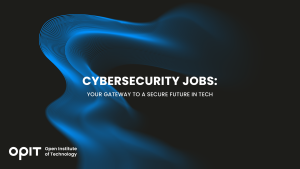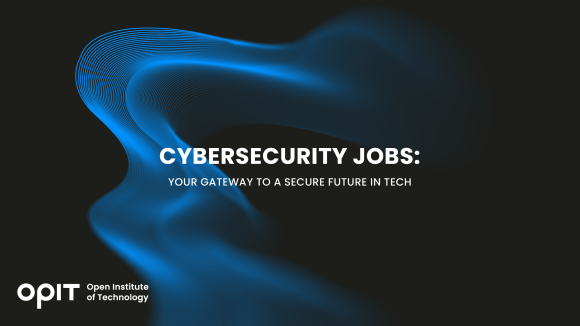

Cybersecurity has been a necessity ever since the advent of digital technology. However, decades ago, few would’ve envisaged just how much demand would eventually grow. Information technology is now such an integral part of modern life, everyone needs to safeguard their digital footprint.
As a result, demand for cybersecurity professionals has never been greater. Let’s take a closer look at both the governmental and private sector positions now available.
The Landscape of Cybersecurity Jobs
The roles within the scope of cybersecurity are broad but united by a common goal: protecting digital assets. Each cybersecurity job relies on another for a comprehensive cyber defense system. Here are some examples:
- Security analysts scrutinize and fortify network defenses.
- Ethical hackers preemptively probe systems for vulnerabilities.
- Incident responders who manage the aftermath of security breaches.
- Security architects who design robust security structures.
- Compliance officers who verify and promote adherence to data protection laws and regulations.
- Malware analysts analyze the nature of malicious software to develop defenses against it.
- Network security engineers take care of the security of an organization’s network from threats and vulnerabilities by installing firewalls and running tests, among other activities.
- Cybersecurity consultants share expert advice to organizations on how to protect their digital assets and follow regulations.
- Information security managers oversee the operations of an organization’s information security department.
- Penetration testers, much like ethical hackers, are authorized to attack systems to find vulnerabilities from an adversary’s perspective.
- Forensic computer analysts, the “detectives” of cybersecurity, investigate cybercrimes by analyzing digital evidence to track down perpetrators and find out the details of a breach.
- Chief information security officer (CISO) is a high-ranking executive responsible for an organization’s overall security strategy against cyber threats.
These professionals are collectively in high demand across various industries. Healthcare, government, finances, and technology, to name but a few. All these industries now depend on valuable documents and client information stored in local databases or the cloud. They also typically boast websites, for both client services and information, which may be targets for malicious actors and attackers. This diversity underscores the universal relevance of cybersecurity, transcending industry boundaries.
Qualifications and Skills for Cybersecurity Careers
Education, certifications, and hands-on experience collectively underpin the path to a cybersecurity job. It’s worth knowing that for you to succeed in the field, you don’t absolutely need a specialized degree, though it certainly helps. However, a bachelor’s degree in computer science, information technology, or a specialist cybersecurity qualification will give you a strong foundation.
Still, the field also places a premium on specialized certifications. Certifications such as CompTIA Security+, Certified Information Systems Security Professional (CISSP), Certified Ethical Hacker (CEH), along with OPIT’s master’s degree in cybersecurity are accolades that signify a professional’s know-how in the field. As such, they will likely put you ahead of the competition for a job position. The competition for cybersecurity jobs is strong, so try and obtain all the qualifications you can get.
OPIT’s MSc in Enterprise Cybersecurity program is one of the best examples of the integration of various fields that link together to create comprehensive cybersecurity measures. It combines theoretical knowledge with practical application, such as simulated cyberattacks, or problems modeled after real-world cyber emergency situations. The program covers a broad spectrum of topics, such as network security, threat intelligence, and legal aspects and ethical considerations.
One of the most valuable cybersecurity skills isn’t one that could be passed down through books or traditional lectures. That skill is strategic thinking. Your strategic mind must be ready to come up with actionable solutions in the heat of the moment, possibly as a response to a situation you’ve never seen before. For that reason, expect this ability to be scrutinized at a cybersecurity job interview.
Building a Career in Cybersecurity: Here’s How You Do It
As mentioned, building a career in cybersecurity takes continuous learning and adaptation, even after you land the job. After laying groundwork for understanding the field through formal education and certification, follow up with internships and entry-level positions. This way, you’ll get invaluable hands-on experience in scenarios that aren’t simulated, rather scenarios with real-life consequences. This is your chance to prove yourself and put what you’ve learned to the test while making a difference for genuine clients or employers.
OPIT offers you a curriculum that balances academic rigor with practical relevance. Students taking this course engage in project-based learning, simulations, and internships, gaining exposure to the challenges they’ll face in their professional careers. Furthermore, OPIT’s strong industry connections mean that students have a one-of-a-kind opportunity to network with seasoned cybersecurity professionals and organizations. This kind of access opens doors to possible quick employment opportunities once you’re out of the program.
Trends in Cybersecurity Employment
Technological advancements drive bad actors to find new vulnerabilities to exploit. For example, the recent rise of AI and machine learning has enabled more sophisticated threat detection and response mechanisms. However, these technologies have their weak spots, many of which are substantially different from what cybersecurity specialists are used to handling.
Recent reports warn of “worms” that could be injected into language models to fish for users’ personal data. Another interesting phenomenon is a tool that claims to “poison” an AI’s training data against training on copyrighted art. In the wrong hands, this could cause significant damage.
Furthermore, “traditional” malware isn’t going anywhere, particularly with the rise of ransomware and identity theft in the last few years. The same goes for malicious software installing crypto miners without a user’s consent. The demand for cybersecurity professionals will grow exponentially, with the Bureau of Labor Statistics projecting a 31% increase in employment of information security analysts from 2019 to 2029. A rate much higher than the average for other occupations.
Security for All
The field of cybersecurity jobs is a promising career path for those looking to make a significant impact in the tech industry. As digital threats proliferate, the need for skilled professionals to combat them has never been greater. OPIT’s cybersecurity programs are at the forefront of this challenge, giving students the knowledge, skills, and insights needed to secure a rewarding future career.
Related posts

Computer Science is fast becoming one of the most valuable fields of study, with high levels of demand and high-salaried career opportunities for successful graduates. If you’re looking for a flexible and rewarding way to hone your computing skills as part of a supportive global community, the BSc in Computer Science at the Open Institute of Technology (OPIT) could be the perfect next step.
Introducing the OPIT BSc in Computer Science
The OPIT BSc in Computer Science is a bachelor’s degree program that provides students with a comprehensive level of both theoretical and practical knowledge of all core areas of computer science. That includes the likes of programming, databases, cloud computing, software development, and artificial intelligence.
Like other programs at OPIT, the Computer Science BSc is delivered exclusively online, with a mixture of recorded and live content for students to engage with. Participants will enjoy the instruction of world-leading lecturers and professors from various fields, including software engineers at major tech brands and esteemed researchers, and will have many paths open to them upon graduation.
Graduates may, for example, seek to push on with their educational journeys, progressing on to a specialized master’s degree at OPIT, like the MSc in Digital Business and Innovation or the MSc in Responsible Artificial Intelligence. Or they could enter the working world in roles like software engineer, data scientist, web developer, app developer, or cybersecurity consultant.
The bullets below outline the key characteristics of this particular course:
- Duration: Three years in total, spread across six terms.
- Content: Core courses for the first four terms, a student-selected specialization for the fifth term, and a capstone project in the final term.
- Focus: Developing detailed theoretical knowledge and practical skills across all core areas of modern computer science.
- Format: Entirely online, with a mixture of live lessons and asynchronous content you can access 24/7 to learn at your own pace.
- Assessment: Progressive assessments over the course of the program, along with a capstone project and dissertation, but no final exams.
What You’ll Learn
Students enrolled in the BSc in Computer Science course at OPIT will enjoy comprehensive instruction in the increasingly diverse sectors that fall under the umbrella of computer science today. That includes a close look at emerging technologies, like AI and machine learning, as well as introductions to the fundamental skills involved in designing and developing pieces of software.
The first four terms are the same for all students. These will include introductions to software engineering, computer security, and cloud computing infrastructure, as well as courses focusing on the core skills that computer scientists invariably need in their careers, like project management, quality assurance, and technical English.
For the fifth term, students will have a choice. They can select five electives from a pool of 27, or select one field to specialize in from a group of five. You may choose to specialize in all things cybersecurity, for example, and learn about emerging cyber threats. Or you could focus more on specific elements of computer science that appeal to your interests and passions, such as game development.
Who It’s For
The BSc in Computer Science program can suit a whole range of prospective applicants and should appeal to anyone with an interest or passion for computing and a desire to pursue a professional career in this field. Whether you’re seeking to enter the world of software development, user experience design, data science, or another related sector, this is the course to consider.
In addition, thanks to OPIT’s engaging, flexible, and exclusively online teaching and learning systems, this course can appeal to people from all over the globe, of different ages, and from different walks of life. It’s equally suitable for recent high school graduates with dreams of making their own apps to seasoned professionals looking to broaden their knowledge or transition to a different career.
The Value of the BSc in Computer Science Course at OPIT
Plenty of universities and higher education establishments around the world offer degrees in computer science, but OPIT’s program stands out for several distinctive reasons.
Firstly, as previously touched upon, all OPIT courses are delivered online. Students have a schedule of live lessons to attend, but can also access recorded content and digital learning resources as and when they choose. This offers an unparalleled level of freedom and flexibility compared to more conventional educational institutions, putting students in the driving seat and letting them learn at their own pace.
OPIT also aims not merely to impart knowledge through lectures and teaching, but to actually help students gain the practical skills they need to take the next logical steps in their education or career. In other words, studying at OPIT isn’t simply about memorizing facts and paragraphs of text; it’s about learning how to apply the knowledge you gain in real-world settings.
OPIT students also enjoy the unique benefits of a global community of like-minded students and world-leading professors. Here, distance is no barrier, and while students and teachers may come from completely different corners of the globe, all are made to feel welcome and heard. Students can reach out to their lecturers when they feel the need for guidance, answers, and advice.
Other benefits of studying with OPIT include:
- Networking opportunities and events, like career fairs, where you can meet and speak with representatives from some of the world’s biggest tech brands
- Consistent support systems from start to finish of your educational journey in the form of mentorships and more
- Helpful tools to expedite your education, like the OPIT AI Copilot, which provides personalized study support
Entry Requirements and Fees
To enroll in the OPIT BSc in Computer Science and take your next steps towards a thrilling and fulfilling career in this field, you’ll need to meet some simple criteria. Unlike other educational institutions, which can impose strict and seemingly unattainable requirements on their applicants, OPIT aims to make tech education more accessible. As a result, aspiring students will require:
- A higher secondary school leaving certificate at EQF Level 4, or equivalent
- B2-level English proficiency, or higher
Naturally, applicants should also have a passion for computer science and a willingness to study, learn, and make the most of the resources, community, and support systems provided by the institute.
In addition, if you happen to have relevant work experience or educational achievements, you may be able to use these to skip certain modules or even entire terms and obtain your degree sooner. OPIT offers a comprehensive credit transfer program, which you can learn more about during the application process.
Regarding fees, OPIT also stands out from the crowd compared to conventional educational institutions, offering affordable rates to make higher tech education more accessible. There are early bird discounts, scholarship opportunities, and even the option to pay either on a term-by-term basis or a one-off up-front fee.

The Open Institute of Technology (OPIT) provides a curated collection of courses for students at every stage of their learning journey, including those who are just starting. For aspiring tech leaders and those who don’t quite feel ready to dive directly into a bachelor’s degree, there’s the OPIT Foundation Program. It’s the perfect starting point to gain core skills, boost confidence, and build a solid base for success.
Introducing the OPIT Foundation Year Program
As the name implies, OPIT’s Foundation Program is about foundation-level knowledge and skills. It’s the only pre-bachelor program in the OPIT lineup, and successful students on this 60-ECTS credit course will obtain a Pre-Tertiary Certificate in Information Technology upon its completion. From there, they can move on to higher levels of learning, like a Bachelor’s in Digital Business or Modern Computer Science.
In other words, the Foundation Program provides a gentle welcome into the world of higher technological education, while also serving as a springboard to help students achieve their long-term goals. By mixing both guided learning and independent study, it also prepares students for the EQF Level 4 experiences and challenges they’ll face once they enroll in a bachelor’s program in IT or a related field.
Here’s a quick breakdown of what the OPIT Foundation Program course involves:
- Duration: Six months, split into two terms, with each term lasting 13 weeks
- Content: Three courses per term, with each one worth 10 ECTS credits, for a total of 60
- Focus: Core skills, like mathematics, English, and introductory-level computing
- Format: Video lectures, independent learning, live sessions, and digital resources (e-books, etc.)
- Assessment: Two to three assessments over the course of the program
What You’ll Learn
The OPIT Foundation Program doesn’t intensely focus on any one particular topic, nor does it thrust onto you the more advanced, complicated aspects of technological education you would find in a bachelor’s or master’s program. Instead, it largely keeps things simple, focusing on the basic building blocks of knowledge and core skills so that students feel comfortable taking the next steps in their studies.
It includes the following courses, spread out across two terms:
- Academic Skills
- Mathematics Literacy I
- Mathematics Literacy II
- Internet and Digital Technology
- Academic Reading, Writing, and Communication
- Introduction to Computer Hardware and Software
Encompassing foundational-level lessons in digital business, computer science, and computer literacy, the Foundation Program produces graduates with a commanding knowledge of common operating systems. Exploring reading and writing, it also helps students master the art of communicating their ideas and responses in clear, academic English.
Who It’s For
The Foundation Year program is for people who are eager to enter the world of technology and eventually pursue a bachelor’s or higher level of education in this field, but feel they need more preparation. It’s for the people who want to work on their core skills and knowledge before progressing to more advanced topics, so that they don’t feel lost or left behind later on.
It can appeal to anyone with a high school-level education and ambitions of pushing themselves further, and to anyone who wants to work in fields like computer science, digital business, and artificial intelligence (AI). You don’t need extensive experience or qualifications to get started (more on that below); just a passion for tech and the motivation to learn.
The Value of the Foundation Program
With technology playing an increasingly integral role in the world today, millions of students want to develop their tech knowledge and skills. The problem is that technology-oriented degree courses can sometimes feel a little too complex or even inaccessible, especially for those who may not have had the most conventional educational journeys in the past.
While so many colleges and universities around the world simply expect students to show up with the relevant skills and knowledge to dive right into degree programs, OPIT understands that some students need a helping hand. That’s where the Foundation Program comes in – it’s the kind of course you won’t find at a typical university, aimed at bridging the gap between high school and higher education.
By progressing through the Foundation Program, students gain not just knowledge, but confidence. The entire course is aimed at eliminating uncertainty and unease. It imbues students with the skills and understanding they need to push onward, to believe in themselves, and to get more value from wherever their education takes them next.
On its own, this course won’t necessarily provide the qualifications you need to move straight into the job market, but it’s a vital stepping stone towards a degree. It also provides numerous other advantages that are unique to the OPIT community:
- Online Learning: Enjoy the benefits of being able to learn at your own pace, from the comfort of home, without the costs and inconveniences associated with relocation, commuting, and so on.
- Strong Support System: OPIT professors regularly check in with students and are on hand around the clock to answer queries and provide guidance.
- Academic Leaders: The OPIT faculty is made up of some of the world’s sharpest minds, including tech company heads, experienced researchers, and even former education ministers.
Entry Requirements and Fees
Unlike OPIT’s other, more advanced courses, the Foundation Program is aimed at beginners, so it does not have particularly strict or complex entry requirements. It’s designed to be as accessible as possible, so that almost anyone can acquire the skills they need to pursue education and a career in technology. The main thing you’ll need is a desire to learn and improve your skills, but applicants should also possess:
- English proficiency at level B2 or higher
- A Secondary School Leaving Certificate, or equivalent
Regarding the fees, OPIT strives to lower the financial barrier of education that can be such a deterrent in conventional education around the world. The institute’s tuition fees are fairly and competitively priced, all-inclusive (without any hidden charges to worry about), and accessible for those working with different budgets.
Given that all resources and instruction are provided online, you can also save a lot of money on relocation and living costs when you study with OPIT. In addition, applicants have the option to pay either up front, with a 10% discount on the total, or on a per-term basis, allowing you to stretch the cost out over a longer period to ease the financial burden.
Have questions?
Visit our FAQ page or get in touch with us!
Write us at +39 335 576 0263
Get in touch at hello@opit.com
Talk to one of our Study Advisors
We are international
We can speak in:


